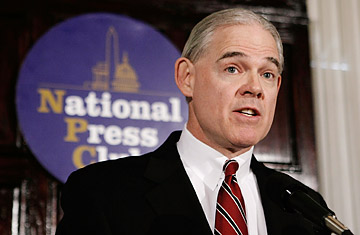
Charles Cooper, lead attorney for California's defense of Proposition 8
Two days before same-sex wedding bells were set to begin chiming throughout California, a three-judge panel of federal appellate judges brought the would-be celebrants back to earth and closed, for now anyway, the courthouse doors. In a terse, two-paragraph ruling issued late on Aug. 16, the judges put gay marriage on hold for months and maybe longer. In doing so, they sent a powerful reminder that no matter how historic, a win at trial is only the first — and by no means the most important — step in changing a law.
The judges granted a request for a stay by the proponents of Proposition 8, the voter-approved initiative that in 2008 banned gay marriage in California by adding a state constitutional amendment. U.S. District Judge Vaughn Walker recently ruled that the initiative is in violation of the U.S. Constitution. Even as the appellate judges granted the stay request, they made clear that the proponents will be pressed to show they have standing to appeal at all, now that the two named defendants in the lawsuit — California's governor and attorney general — have declined to appeal Walker's decision. "In addition to any issues appellants wish to raise on appeal, appellants are directed to include in their opening brief a discussion of why this appeal should not be dismissed for lack of Article III standing. See Arizonans for Official English v. Arizona," the three-judge panel ruled.
Beyond the question of standing, Monday's order included no hint as to what the judges think about Walker's ruling in favor of gay marriage, and it's by no means certain that they will be the same judges who hear the appeal, now scheduled for arguments in December. But in asserting their complete control over the case's timing and its arguments — and by casually tossing aside (without even bothering to explain why) Walker's order that would have allowed marriages to resume as of Wednesday night — the appeals court is reminding all parties that what has come before has been a mere prelude.
And it appears to have been a fact well understood by the proponents of Prop 8, who find themselves with their backs against a wall but not without resources. The proponents' lead attorney, former Reagan-era Justice Department lawyer Charles Cooper, has tipped his hand about where he'll strike with his appeal, now due Sept. 17. It's a remarkable — and, with the court's permission, longer than normally permitted — brief, which in 75 pages lays out a vigorous defense of Prop 8 that stands in stark contrast to the generally anemic defense his side presented at trial.
During the trial, plaintiff attorney Ted Olson brought nine expert and eight lay witnesses to the stand, compared with just two who testified — under withering cross-examination by David Boies for the plaintiffs — in favor of Prop 8. Walker noted the lopsided trial work in his 138-page ruling. "The evidence shows Proposition 8 does nothing more than enshrine in the California Constitution the notion that opposite-sex couples are superior to same-sex couples," Walker said in concluding his ruling. "Plaintiffs have demonstrated by overwhelming evidence that Proposition 8 violates their due process and equal-protection rights and that they will continue to suffer these constitutional violations until state officials cease enforcement of Proposition 8."
That robust record of factual findings buoyed the spirits of supporters who saw in Walker's ruling a powerful attempt to present the issues in a way that could tie the appellate courts' hands. But Cooper's brief reveals a strategy that looks like nothing if not a plan to proceed as if the trial didn't happen. All but ignoring Walker's conclusions to the contrary, Cooper argues that the right to marriage does not include the right to same-sex marriage, which he said would be a new right — and one not subject to the same strong protections enjoyed by fundamental rights like marriage. He argues, too, that gays and lesbians as a class are different than racial minorities, or even gender classes, because sexual orientation is harder to define, and gays lack the political powerlessness that racial minorities were enduring when they were given constitutional protections.
